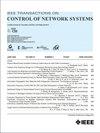具有反馈延迟和通信延迟的聚合博弈的次线性动态遗憾
IF 4
3区 计算机科学
Q2 AUTOMATION & CONTROL SYSTEMS
引用次数: 0
摘要
本文章由计算机程序翻译,如有差异,请以英文原文为准。
Sublinear Dynamic Regrets for Aggregative Games With Feedback Delays and Communication Delays
In this article, we investigate aggregative game problems in dynamic environments, where the cost functions of players change over time and are revealed gradually after players select their strategies in given strategy sets. Specifically, after selecting strategies, players observe the corresponding cost functions with feedback delays. Moreover, players receive the information of their neighbors with communication delays in weight-unbalanced digraphs. To handle such aggregative game problems, a robust learning algorithm is proposed to track time-varying Nash equilibria. The upper bounds of dynamic regrets are given to illustrate the performance of the proposed algorithm. We quantify the impact of both feedback delays and communication delays on dynamic regrets and give the framework to analyze the convergence of strategies in the case of delays. The proposed algorithm achieves the sublinearity of dynamic regrets in the absence of delays. A numerical example is given to illustrate the efficiency of the proposed learning algorithm.
求助全文
通过发布文献求助,成功后即可免费获取论文全文。
去求助
来源期刊

IEEE Transactions on Control of Network Systems
Mathematics-Control and Optimization
CiteScore
7.80
自引率
7.10%
发文量
169
期刊介绍:
The IEEE Transactions on Control of Network Systems is committed to the timely publication of high-impact papers at the intersection of control systems and network science. In particular, the journal addresses research on the analysis, design and implementation of networked control systems, as well as control over networks. Relevant work includes the full spectrum from basic research on control systems to the design of engineering solutions for automatic control of, and over, networks. The topics covered by this journal include: Coordinated control and estimation over networks, Control and computation over sensor networks, Control under communication constraints, Control and performance analysis issues that arise in the dynamics of networks used in application areas such as communications, computers, transportation, manufacturing, Web ranking and aggregation, social networks, biology, power systems, economics, Synchronization of activities across a controlled network, Stability analysis of controlled networks, Analysis of networks as hybrid dynamical systems.
 求助内容:
求助内容: 应助结果提醒方式:
应助结果提醒方式:


